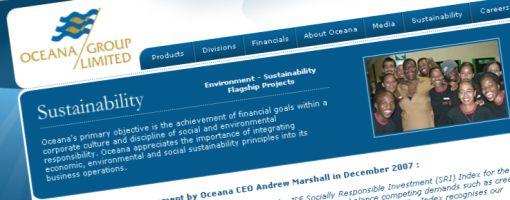Namibian-South African fishing company setting up in occupied WS

Not many years ago, Namibia was occupied by neighbouring South Africa. At the time, the Security Council imposed legal sanctions on foreign investments and trade in occupied Namibia. On Thursday, South African SABC TV revealed that Namibians and South Africans are fishing in occupied Western Sahara.
Published 17 July 2008
The revelation on South African Broadcasting Corporation (SABC) TV's evening news programme 'African Views' was made by the chairman of the Norwegian Support Committee for Western Sahara, Mr. Ronny Hansen, who said that his organization's research has uncovered that the Namibian-South African fishing company, the Walvis Bay based Etosha Fishing Corp (Pty) Ltd has been active for a year already.
"Through their involvement with the Moroccan occupying power in Western Sahara these South African and Namibian business interests are actively supporting the occupation of the last colony in Africa", Hansen said.
He added that "Their involvement helps both motivate and finance the presence of Moroccan military troops and the illegal transfer of Moroccan civilian settlers to Western Sahara. This has to stop."
A challenge to regional solidarity
The liberated Namibia and South Africa are today two of the strongest supporters of the Sahrawi Arabic Democratic Republic (SADR), which is mainly under illegal Moroccan occupation. Both states have full diplomatic relations with the Sahrawi republic, and strongly support the Sahrawi people's right to self-determination and independence in the UN and the in African Union.
But some Namibian and South African business interests have other interests, strongly at odds with the positions of their respective governments.
Etosha Fishing Corp (Pty) Ltd has moved into the occupied Western Sahara without having consulted the Namibian or Western Saharan authorities.
"We have been fishing there for one year now. I have just sent my people up there, and we are now starting to ship the fish to Namibia", said managing director of Etosha, Mr Phillip Conradie, to the Norwegian Support Committee for Western Sahara Tuesday this week.
Conradie confirms that their two vessels Morgenstern and Iona are currently in Western Saharan waters under a Moroccan licence. The vessels are registered on the Caribbean island state St. Kitts and Nevis which also recognises the Western Sahara republic.
Since the fishing started in Western Sahara one year ago, their catches have been exported to canners "all over the world", according to Conradie. From now on, the fish is going to be frozen, and shipped to the Namibian market.
Employing Moroccans
Etosha's main partner for freezing of the catches, is the Moroccan fish processing company Dipromer. In addition, Etosha rents other smaller freezing facilities around in Dakhla.
Dipromer also holds Etosha's fishing licence, through their joint venture. The licence is for 40.000 tonnes of fish a year, and permits fishing of sardines and sardinella, according to Conradie.
The 2 vessels have Namibian and South African personnel and captain. The licence with the Moroccan Fisheries Ministry obliges Etosha to employ 3 Moroccans on each vessel, according to Conradie.
"We are monitoring the situation in Western Sahara, but are not following it very very closely", said Conradie to the Norwegian Support Committee for Western Sahara.
Conradie says the Etosha management has not been in contact with Namibian authorities over this involvement. The company is 45% percent owned by Oceana Group Ltd South Africa (http://www.oceana.co.za/about/group.php).
9 injured Sahrawis
A 2002 legal opinion by the UN affirms that dealings in Western Sahara can only be considered to be in accordance with international law if it is to the benefit of, and in the interest of the local population.
It is not.
A group of Sahrawis, the indigenous population of Western Sahara, last week protested the foreign and Moroccan fishing industry in Dakhla. 9 people were injured after the Moroccan police intervened, according to the Committee against torture in Dakhla http://wsrw.org/?cat=105&art=787.
The foreign fishing industry in occupied Western Sahara gives job opportunities for Moroccan settlers who have been illegally moved into the country by Morocco.
Namibian responsibility
According to the Dutch-Portuguese international jurist Pedro Pinto Leite, Namibia bears a special legal and historical responsibility to make sure their companies are not involved in Western Sahara.
"The legal justification of Namibia's so-called Decree No. 1, enacted by the United Nations Council for Namibia for the protection of the natural resources of that territory, applies equally to the condemnation of the current plundering of the resources of Western Sahara", said Pinto Leite.
Leite last year co-edited the book "International Law and the Question of Western Sahara", in which scholars of international law from a large number of countries contributed.
"The passivity of the Security Council in this matter is due to the obstruction by France and the lack of political will of some of its other members, not to the absence of legal arguments. It will be interesting to see whether Namibia will remember its own history, and either take their own companies to court or in any other way oblige them to follow international law in this matter", Pinto Leite said.
News
NY Check new Western Sahara poster!
“Try to Visit Western Sahara”…
10 July 2020
The Security Council fails Western Sahara and international law
On 31 October 2025, a new resolution was adopted in the UN Security Council calling on the Saharawis to negotiate a solution that would entail their incorporation into the occupying power, Morocco.
03 November 2025
Saharawis Demonstrate Against Trump Proposal
The United States has proposed in a meeting of the UN Security Council on Thursday that the occupied Western Sahara be incorporated into Morocco.
28 October 2025
Skretting Turkey misled about sustainability
Dutch-Norwegian fish feed giant admits using conflict fishmeal from occupied Western Sahara. Last month, it removed a fake sustainability claim from its website.
27 October 2025



